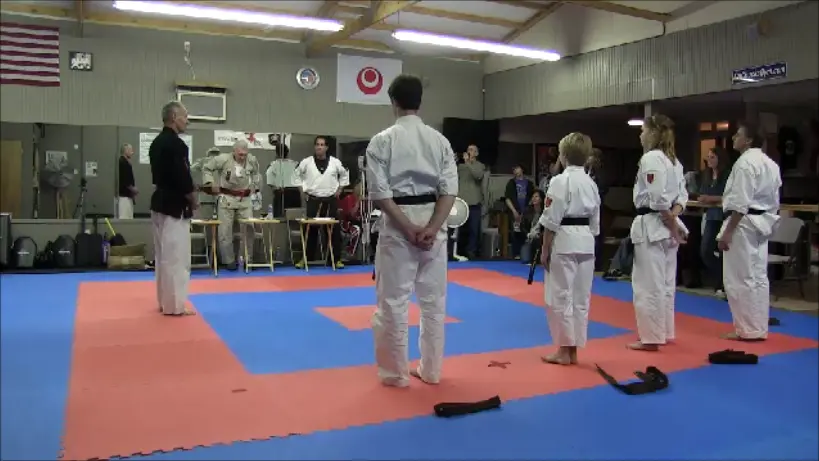
Mar 03, 2016 • 5 min read
Martial Arts Philosophy: A Way of Mental Toughness
Posted in:
Many parents have told me that their child does well in the batting cage, but when playing in a game, it looks like they’ve never swung a bat before.
Pressure causes the mind to race, the muscles to tighten and the body to fall out of rhythm. Therefore, an understanding of how to keep emotions in check is crucial for the development of mental toughness. As far as results are concerned, it’s the difference maker!
“Emotion can be the enemy. If you give in to your emotion, you lose yourself. You must be at one with your emotion, because the body always follows the mind.” – Bruce Lee
 This is the most fundamental truth in training, especially for a young athlete. But today’s youth sports culture does not cultivate mindfulness during competition. Instead, kids are being pressured to produce instant results and emotions are winning the battle. This misguided focus on outcomes inhibits the development of mental toughness.
This is the most fundamental truth in training, especially for a young athlete. But today’s youth sports culture does not cultivate mindfulness during competition. Instead, kids are being pressured to produce instant results and emotions are winning the battle. This misguided focus on outcomes inhibits the development of mental toughness.
Through many years of martial arts training, this simple truth has become instilled in me: that to excel at something, there must be a mindful process associated with it; just wanting something is not nearly enough. Karate-do (pronounced doe) means “The way of karate.” It’s more than physical self-defense movements. It’s a process of living one’s life. In baseball, it could be referred to as ”yakyu-do” or, “a way of baseball”–a way of teaching kids to be mentally strong through baseball, or whatever sport they have an interest in.
Keep a calm mind―an over competitive mind is a confused mind; it does not see things clearly and leads to an out of control body.
Like physical skill, mental toughness takes time to develop. Too much too soon and the mind will experience exhaustion, just like the muscles. During the game, loud, overbearing parents with unrealistic expectations only serve to confuse the mind of a young, inexperienced athlete. They become distracted by senseless instructions given by well-meaning, but unknowing adults, and the moment is lost. If this continues, kids become trained to listen to their parent’s voice during competition instead of trusting their own natural reactions. This backwards approach makes them a weak―and unhappy― competitor. It must be remembered that when interest and enthusiasm are lost, mental toughness will no longer have an environment in which to grow.
Developing mental toughness has more to do with a person’s attitude and perspective than learning technique.
When one learns to integrate respect, humility, self-discipline and self-control with the physical and emotional aspects associated with their art or sport, mental toughness is the result. The mind is able to let go of self-interest, and is freed from distractions that would otherwise cause us to fail. When approached this way, thoughts of outcomes, other people’s expectations, or developing skill quickly, quietly disappear as training accumulates in us. The mind ceases to attach to negative and counterproductive thoughts, allowing us to just play the game naturally.
Martial Arts Philosophy
 Lack of respect for an opponent will mean underestimating that opponent. Lack of humility in one’s self will result in a cessation of learning. Lack of self-discipline will make it impossible to stay the course when needed. And, lack of self-control will impede your ability to bring your best to the situation. These life lessons from the martial arts are real and sustainable, and an understanding of these truths will build a strong mind for competition and beyond. Teaching these truths should be front and center in all youth sports programs.
Lack of respect for an opponent will mean underestimating that opponent. Lack of humility in one’s self will result in a cessation of learning. Lack of self-discipline will make it impossible to stay the course when needed. And, lack of self-control will impede your ability to bring your best to the situation. These life lessons from the martial arts are real and sustainable, and an understanding of these truths will build a strong mind for competition and beyond. Teaching these truths should be front and center in all youth sports programs.
Kids just want their parents to come and watch them play, not intervene every time something doesn’t go their way. Martial arts philosophy teaches the character necessary to develop mental toughness–but so does good parenting. The makeup of our character is what ultimately allows mental toughness to grow because with strong character, we intuitively want to do the right thing. By being accountable for our own behavior, we aren’t looking for shortcut and we aren’t interested in blaming others or making excuses. We become strong!
Chuck Schumacher is the author of “How to Play Baseball: A Parents Role in Their Child’s Journey,” available at www.chuckschumacher.com (signed copy) or Amazon. Chuck has 20 years experience as a youth baseball coach and 40 years experience in martial arts. In 2006, he opened Chuck’s Gym in Franklin, Tenn., where he teaches baseball and Okinawan karate. You can contact Chuck at chucksgym@comcast.net.
